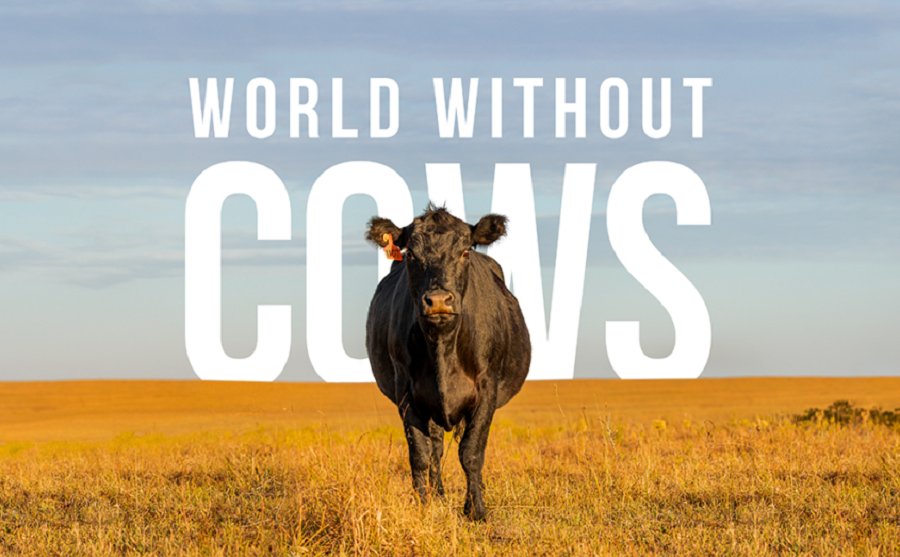Do we really want to live in a "World Without Cows"?

Today, animal farming is often blamed as the main cause of climate change and many of the world’s problems. Some environmentalists and animal rights activists are campaigning to end meat consumption and close all livestock farms. But what would happen if everyone became vegan? What would a world without cows or farm animals in general look like? Have you ever asked yourself that? A group of livestock experts and scientists set out to answer this very question in the film “World Without Cows“, a documentary that explores the complex and often surprising role of cows for our health and the planet. Through interviews with farmers, ranchers, scientists, and environmental experts, award-winning journalists Michelle Michael and Brandon Whitworth travelled to over fourty global locations to examine the cultural and economic relevance of cows, their contribution to global nutrition, and their true impact on the climate.
Would we be better off in a world without cows?
The documentary invites viewers to reflect on a central question: “Would we be better off in a world without cows?“. The answers are not simple, as cows influence many aspects of society, from agriculture and culture to nutrition and the environment. Based on scientific evidence and through conversations with experts in environmental and agricultural science around the world, Michelle Michael and Brandon Whitworth examined in-depth key issues related to methane emissions, food security, global land use, the many co-products of beef production and the possible repercussions of the absence of cows. In their search for the truth behind often oversimplified debates, Michelle and Brandon found that while cows contribute about 5–7% of global greenhouse gas emissions, the full picture is far more complex.
Methane emissions, for example, account for about 30% of global methane emissions. However, scientific evidence indicates that methane from cattle, primarily due to enteric fermentation, remains in the atmosphere for only around 12 years, much shorter than the centuries for CO₂. This means that reducing methane emissions can more quickly have an impact on slowing climate change. Scientists are exploring solutions such as dietary changes, selective breeding, and microbiome interventions to reduce emissions at the source, achieving great results. When we hear that most of the world’s agricultural land is used for livestock, it’s important to understand that a large portion of the land used for grazing livestock is unsuitable for growing crops for direct human consumption. Grazing animals help maintain healthy soils, as grazing stimulates plants to release carbon compounds that feed soil microbes, improving soil fertility and helping sequester carbon. This process supports more sustainable land use practices, and by capturing and storing carbon in the soil, it is possible to reduce the amount of CO₂ in the atmosphere, helping to mitigate the effects of climate change.
Moreover, cattle play a vital role in agricultural circularity through a process known as upcycling. They can convert inedible agricultural byproducts of crop production, like stalks, husks and other residues, into high-quality, nutrient-dense food for humans. This reduces waste and increases overall food system efficiency, as cattle can convert 600 grammes of low-quality plant protein into 1 kilogram of high-quality animal protein. Even more importantly, cattle significantly contribute to global food security, providing about 33% of the protein and 17% of the calories consumed by people worldwide, providing essential nutrients that are difficult to obtain from other sources, like plants. Beef and dairy are especially important in addressing malnutrition in vulnerable populations, such as women and children in low-income rural areas. Eliminating livestock farming could reduce access to essential nutrients for billions of people, worsening poverty and malnutrition.
Cows contribute much more than meat and milk to society
The conversation around livestock often focuses narrowly on diet and emissions, but removing cattle would have ripple effects far beyond food. Cows contribute much more than meat and milk; their byproducts are essential to many aspects of our daily lives. They play a hidden yet vital role in producing items we often take for granted: cows provide key components like life-saving drugs to surgical materials, collagen for wound dressings and joint repairs, gelatine for capsules and vaccines, and other biological materials used in everything from heart valves to insulin production. These medical uses are often overlooked yet vital to modern healthcare systems worldwide. Even musical instruments, tyres, fertilisers, cosmetics, leather, pet food, and many household goods contain cattle-derived materials that are difficult to replace sustainably or economically. This underscores the reality that cows are deeply embedded in global supply chains in the agriculture, food, health, and manufacturing industries. Eliminating cows from our ecosystem would impact our food system and disrupt a wide range of industries that rely on cattle-derived materials, from pharmaceuticals to packaging, textiles, sports equipment and even pet care products. Recognising the multifaceted role of cattle challenges us to think more holistically about their place in society and the consequences of a world without them.
There is an urgent need for dialogue One of the film’s most important messages is the urgent need for dialogue. It shows that bringing together farmers, society, and decision-makers to talk openly and honestly is essential. Without this kind of communication, it’s impossible to find balanced solutions for the environment, the economy, and the people who depend on livestock. The “World Without Cows” documentary invites us to reconsider eliminating livestock, showing that doing so could have far-reaching consequences for nutrition, sustainability, and ecosystems worldwide. The science behind World Without Cows is not just informative; it’s essential for sparking thoughtful, evidence-based conversations to create real and lasting change for people and the planet. The film emphasises that we can only move towards a sustainable future through collaboration and understanding.